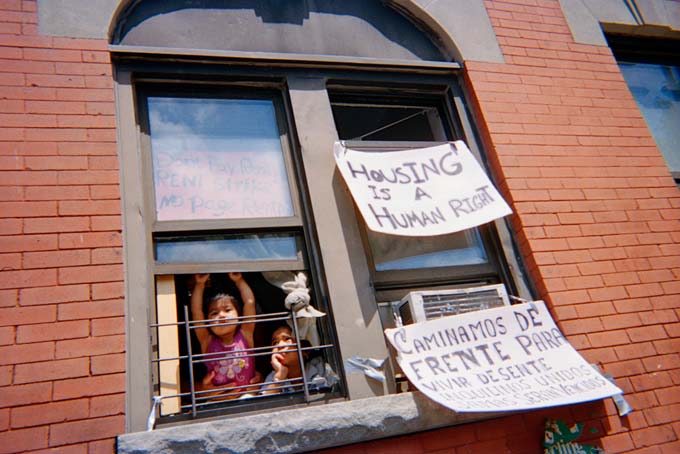
Children in the window of a Sunset Park apartment where tenants undertook a rent strike to demand fair living conditions. Photo by Noelle Théard, 2012, via galeriadelbarrio.org.
This mix [MP3], which Jace Clayton (also known as DJ/rupture) produced last summer, is rooted in both the sounds and struggles of Sunset Park, Brooklyn, a mostly Latino and Chinese working-class neighborhood where the artist has lived since 2006. Just a few doors away from Clayton’s apartment, in three buildings on 46th Street managed by the same slum landlord, Orazio Petito, a rent strike was underway. Residents were protesting horrendous living conditions: constant cuts to electricity and heat, widespread plumbing problems, leaks, mold and a basement filled with asbestos and construction waste (where residents were forced to climb through in order to reach the fuse box). While a few residents began withholding rent in 2010, the strike really got going last summer.
By July 2012, 25 of the 51 families living in the buildings owned by Petito were withholding rent.
In July 2012, Occupy Sunset Park organizers found out about the strike and occupied the office of New York State assemblyman Felix Ortiz, who had promised to resolve the situation but was slow to take action. By then, 25 of the 51 families living in the buildings owned by Petito were withholding rent. Many of the residents still paying rent were understandably afraid to join the strike because they were undocumented and the landlord threatened to call ICE (Immigrations and Customs Enforcement). Although local politicians, including mayoral candidate and City Council Speaker Christine Quinn, have long taken up the residents’ cause, the mortgage holder, Seryl LLC, has only now begun to make superficial repairs to the buildings.
With the summer heat reminding us a year has passed since the rent strike took off, we caught up with Clayton to talk about the community that lent its voices to his mix, the social structures that characterize cumbia—a varied genre of Latin American dance music—and how a block party became a forum for social change.
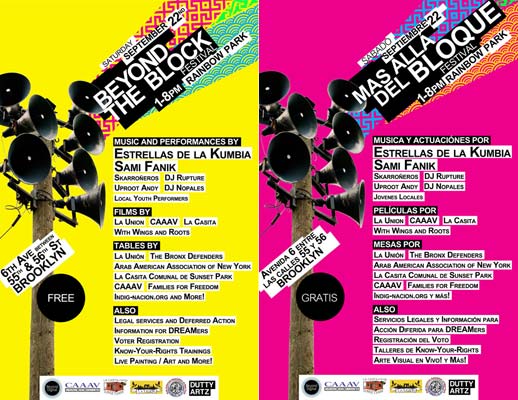
Posters for “Beyond the Block” party designed by Diego Gutierrez.
Last summer, friends and I threw a community-minded block party at Rainbow Park in Brooklyn’s Sunset Park neighborhood. The basic idea was to air live music that reflected the population here—mostly Latino, Chinese and Arab—to bring folks together in a space with great sound, while neighborhood community groups offered information and services. Our “we” grew over time, expanding to include people from Beyond Digital, Dutty Artz, The Arab American Association of New York, CAAAV, La Union, Sound Liberation Front and various local artists and community members. This was our mission statement:
Can a hype block party double as an opportunity to spread information about stop and frisk, immigrant rights, police surveillance and housing? We say yes. As the championing of diversity, a global outlook, and a celebration of the local become increasingly common in today’s dance music scenes, we see an ideal opportunity to use the energy and open-ended vibe of a great party to connect musical ideas to their real-world analogs—to create a space where we can talk about—and dance to—an incredible musical selection while sharing useful information for our communities that are impacted by issues pertaining to undocumented workers’ rights, transnational identity, health care, police violence, housing and more.
We focused on local, person-to-person outreach—that’s why you didn’t see mention of this event on any blogs. If the dominant mode of musical experience today is a web-sped diet of consume and move on, then “Beyond The Block” opened up a space to learn about the slow social manifestations of all the music that moves us and to ask how our excitement over these sounds can contribute, in a direct way, to the communities where their heartbeats come from.
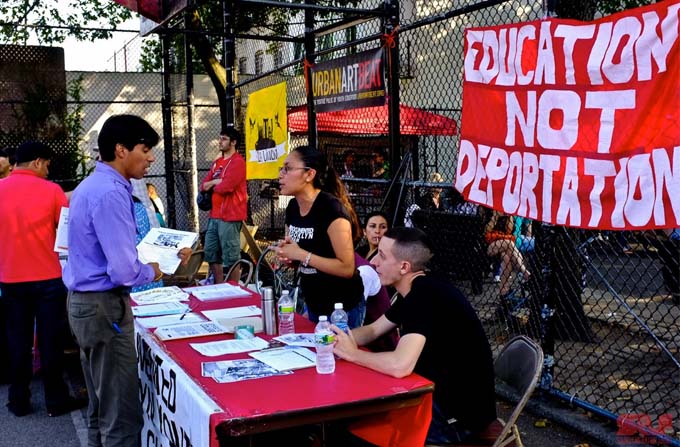
Community organizations at the “Beyond the Block” party. Photo by Sound Liberation Front, 2012.
As the planning progressed, I began thinking about ways to extend the outburst of energy that comes—then goes!—with putting on a party. This mixtape idea clicked into place all at once: I would select made-in-the-USA Mexican cumbia instrumentals that I’ve purchased in Sunset Park and have those sounds serve as a backing track to the rent strikers explaining, in their own words, why they are struggling. Most of the three rent-striking buildings’ residents are Latino immigrants, many from Mexico. I mentioned my idea at a meeting—people were into it. Pues… ¡Vámonos!
I had heard about what was going on through fellow “Beyond the Block” organizer and photographer Noelle Théard, who introduced me to some of the principal rent strikers. Dennis Flores, a lifelong Sunset Park resident and organizer for Occupy Sunset Park, conducted incredible interviews for use in the mix. As the Spanish speakers among us will hear, one of the other great things about these interviews is how very different each person’s perspective on the rent strike is. It ranges from deeply personal accounts—say, of dirty water dripping on one woman’s stovetop—to broad political analysis examining the banks’ roles, to philosophical reflections on rights and dignity and how a just struggle can empower. If you don’t understand the Spanish, then hopefully the cumbia music—bittersweet, optimistic, about maintaining a groove rather than flash—will communicate. We sold it at the block party, donated all proceeds to the rent strikers and then shared it on the Web.
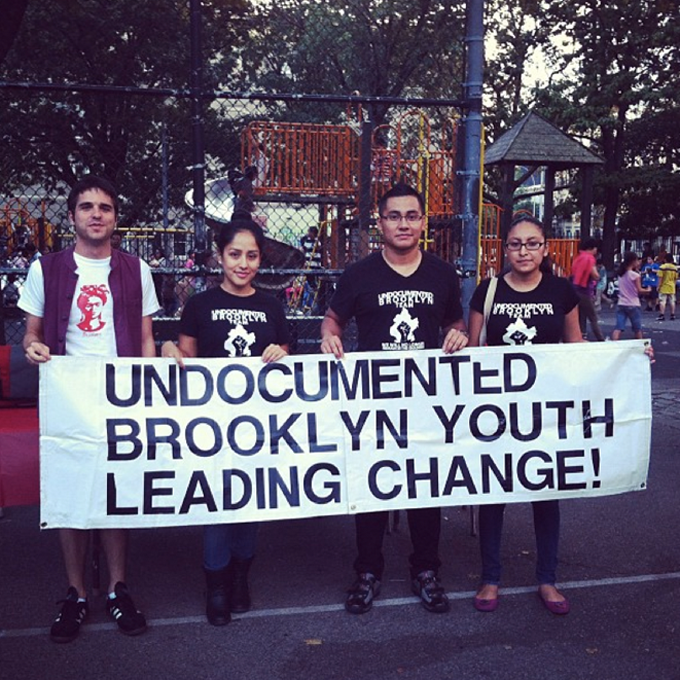
Undocumented Brooklyn youth organizing at the “Beyond the Block” party. Photo by Ty Ushka, 2012.
My “Sunset Park Rent Strike Speakout Mix” was directly inspired by Mexican sonideros. These “sound people” literally speak community into existence. At a cumbia sonidera event, the sonidero will talk on the mic and select tunes, narrate the party and take requests to dedicate shout-outs to often-distant family, friends and lovers. Dozens of sonidero parties rock New York City each month, from private weddings to all-nighters in inconspicuous venues under the BQE.
Cumbia champions
resilience and
sustainability, which makes it a potent sonic counterpart to the daily struggles of a
working-class
neighborhood.
Cumbia sonidera transmits powerful communitarian vibrations, at once hyper-local and transnational. The sonideros‘ constant shout-outs are fascinating as a format, even if they’re only saying, “Hey you there, this person here is thinking of you.” The structure of cumbia sonidera is a kind of pre-political configuration: it de-virtualizes person-to-person communication while providing a flashpoint of Mexican visibility – especially relevant in the States where so much Mexican labor is rendered invisible. So with the mix I thought: let’s have people talking about their living conditions, who determines them and what they want to do about it—the essentials of politics—embedded in the Mexican media format of cumbia sonidera.
One of the things I find so fascinating about cumbia in general and cumbia sonidera in particular is that it has existed across the Americas for so long but has remained beneath the radar because people look down on it as a lower-class phenomenon, and the genre itself is not particularly interested in narratives of progress, choosing instead to emphasize presence. Cumbia moves slowly. Novelty fuels much music appreciation, but cumbia sidesteps that. The music champions resilience and sustainability, which makes it a potent sonic counterpart to the daily struggles of a working-class neighborhood.
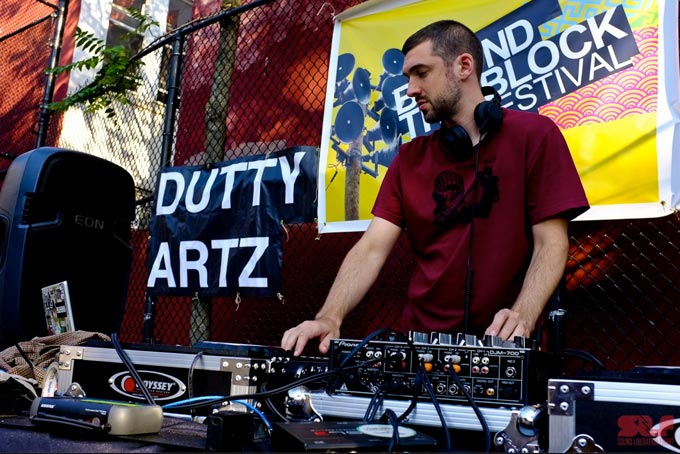
Dutty Artz DJ Uproot Andy at the “Beyond the Block” party. Photo by Sound Liberation Front, 2012.
The editors would like to thank Dennis Flores for the information he provided regarding the Sunset Park rent strike.

